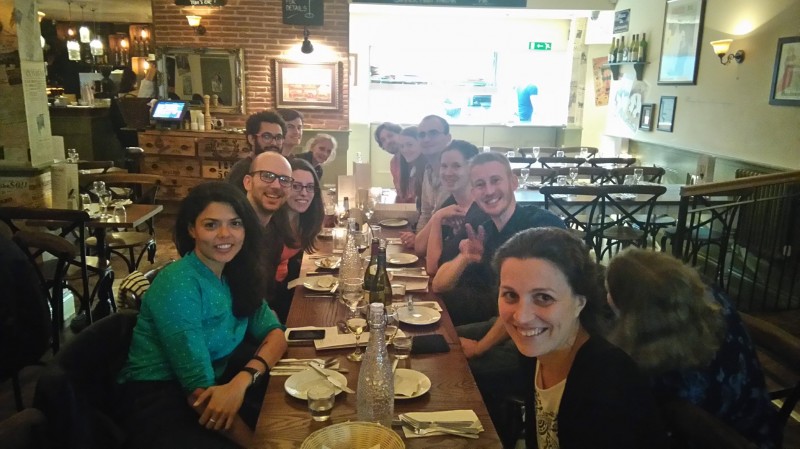Biennial Challenger Conference: Liverpool
Peter Sheehan
UEA

There is a fine line between inspiration and intimidation. When surrounded by so much that is excellent in marine science, it can be easy to slip into thinking that your own efforts will never quite match up. But those feelings last all of ten minutes. The atmosphere at the Challenger conference is so warm and inclusive, so much is it clear that everyone wants you to succeed, that imposter syndrome is quick to subside. I receive nothing but warm encouragement throughout the conference and, most encouragingly, genuine interest from the people I talk to. The inescapable conclusion is that marine science is collaborative, and all the better for it
The friendly atmosphere is not quit enough to allay my fears before I give my talk, however – the first talk that I have given at a meeting of this size. And it is the last talk of the last session, which has kept me on my toes since arriving in Liverpool four days previously. My mouth runs dry, and my footsteps on the walk down to the front of the lecture theatre seem to make an unnaturally loud thud. Of course, the talk is fine, the only hitch being my continued inability – despite the best efforts of all four of my supervisors – to get east and west the right way round. Anyone reading my thesis is advised to take my directions with a generous pinch of salt…
Of other people’s talks, I quickly learn that even the most un-related of topics can yield something useful: an interesting way of plotting data that I hadn’t thought of myself, or a methodological trick that would have made my life so much easier had I known it when I started my PhD. I am particularly excited by the talks on ocean gliders: a large part of my own research uses data from UEA’s Seaglider fleet, and insights into how others have analysed glider data is always welcome!
Then again, so much of Challenger happens after hours that I’d wager I got almost as much out of bar-side chats in pubs as I did from the conference proper. My understanding of the finer points of plankton ecology is somewhat limited but the language of beer is universal. It’s during these more intimate chats that I actually talk the most about my science – that I do the most useful networking. Sure, talking about yourself is easier after a drink or too but, particularly for the more inexperienced researcher, the informality of a bar-side chat is a much less daunting way of talking about your ideas.
I return home at the end of the conference in need of a couple of quiet days, but definitely on the right side of the inspiration/intimidation fence. I have my first major talk under my belt, a host of fresh ideas for my research, and new contacts from across the UK. I am grateful to the Challenger Society for giving me this opportunity. I’m looking forward to coming back.
Profile:
I am in the third year of my PhD at the University of East Anglia in Norwich, where I do research on the long- and short-term variability of the Fair Isle Current, one of the most important inflows of Atlantic water into the North Sea. I use data from CTD profiles and from Seagliders, so interpolation onto a common grid has become a big part of my life. My project is jointly supervised by Marine Scotland, so trips to sunny Aberdeen have become a not-infrequent feature of my diary.
Latest News
Royal Society Publishing Photography Competition 2025
Please see a message from the Royal Society below:
We are delighted to announce that the 2025 Competition is now open for entries until 15 August for a chance to win £1000! The competition celebrates the power of photography in conveying the wonder of science happening all around us and photographs can be submitted in the categories of: Astronomy, Behaviour, Earth Science and Climatology, Ecology and Environmental Science, and Microimaging.
The competition is free to enter and open to anyone studying or working in science at graduate level or above. Category winners will receive a one-year membership to the Royal Photographic Society and the overall winner will receive a grand prize of £1,000. Find out more: https://bit.ly/RSPphotocomp
October 2025 MEDIN Workshop: Marine Data Management, Governance and the MEDIN toolset
The Marine Environmental Data and Information Network (MEDIN) are pleased to announce that registration is now open for the next occurrence of our popular free online training workshop: ‘Marine Data Management, Governance and the MEDIN toolset’ on the 13th – 17th October 2025 on OceanTeacher Global Academy.
Marine Data Management, Governance and the MEDIN toolset
The Marine Environmental Data and Information Network (MEDIN) and OceanWise are delighted to invite you to attend our popular free online training workshop: ‘Marine Data Management, Governance and the MEDIN toolset’ on the 19th – 23rd of May 2025.
